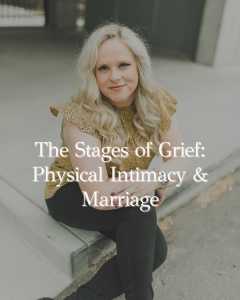
Sexual grief is something many experience but few talk about. In this episode, we explore what it means to grieve the sex life you thought you’d have, and why making grief your companion instead of your enemy can lead to deeper healing, connection, and hope. You’ll hear how sexual grief shows up in different ways, from unmet expectations to struggles with desire or intimacy, and why acknowledging it matters. Most importantly, you’ll learn how grief, when faced with compassion, can become a guide toward creating a more authentic and meaningful intimate life. If you have ever felt grief, and then shame, about your sex life, this is the episode for you.
Show Notes:
Follow Amanda on Facebook and Instagram.
Sources
Quote about grief as companion from: At Last She Said It: Episode 223: Making Friends with Change | A Conversation about Hope, Jul 15, 2025
Show Summary:
Today we’re talking about something that so many of you experience but rarely gets talked about openly: sexual grief.
You know, I was listening to another podcast recently where the host talked about making grief her companion rather than constantly fighting it, and it really struck me how this applies to our sexual and intimate lives too. Sometimes we need to grieve the gap between what we thought our sex life would be like and what it actually is.
What Is Sexual Grief?
Sexual grief is the deep sadness and loss we feel when our sexual reality doesn’t match our expectations or hopes. It’s mourning the sex life you thought you’d have, the intimacy you dreamed about, or the connection you believed would come naturally.
But here’s what makes sexual grief particularly complex – it’s often what I call a “hidden grief.” Unlike other losses in our lives, we rarely talk about sexual disappointments openly. When someone loses a job, we rally around them. When someone’s parent dies, we bring casseroles and offer hugs. But when someone is mourning their sexual expectations? There’s silence.
This silence makes sexual grief feel isolating and shameful. You start to think you’re the only one struggling, the only one disappointed, the only one whose body isn’t cooperating the way you expected. But I’m here to tell you – you are absolutely not alone.
Sexual grief can show up in so many ways. Sometimes it’s acute – like sobbing in the bathroom after another painful attempt at intercourse. Sometimes it’s chronic – a low-level sadness that follows you around, making you feel disconnected from your spouse or your own body. Sometimes it comes in waves, triggered by a movie scene, a friend’s comment, or even a church lesson about the beauty of marital intimacy.
What makes it even more complicated is that sexual grief often involves grieving something you never actually had. It’s not like mourning a person who died or a job you lost. You’re grieving a fantasy, an expectation, a hope – which can make you question whether your grief is even valid. Spoiler alert: it absolutely is.
Another layer of sexual grief is that it often involves grieving parts of yourself. Maybe you’re mourning the spontaneous, passionate person you thought you were. Maybe you’re grieving your confidence, your sense of desirability, or your belief that your body was designed to experience pleasure. These identity losses can be just as painful as the physical or relational disappointments.
Let me give you some examples of what this might look like:
The newlywed who thought sex would be instantly amazing. Maybe you saved yourself for marriage, did everything “right,” and expected that your wedding night would be magical and that great sex would just flow naturally. Instead, you’re dealing with pain, awkwardness, or just… disappointment. You might be grieving the fairy tale you were sold.
The woman who struggles with her body’s response. Perhaps you’ve been married for years but you’ve never experienced an orgasm, or your body just doesn’t respond the way you see in movies or read about in books. You’re grieving what feels like a broken part of yourself.
The man dealing with erectile dysfunction. You might be mourning your ability to perform the way you used to, or the spontaneous sex life you once had.
The couple facing mismatched desires. One of you wants sex daily, the other monthly. You’re both grieving – one person grieves feeling unwanted, the other grieves feeling pressured.
The spouse of someone with low libido. You’re grieving the passionate marriage you thought you’d have, the feeling of being desired, or the physical connection you craved.
The spouse who has given up initiating. Maybe you’ve faced rejection so many times that you’ve stopped trying altogether. You’re grieving not just the sex you’re not having, but the part of yourself that used to feel bold and desiring. You’re mourning the version of yourself who believed your spouse wanted you.
The woman who can’t get pregnant. You’re not just grieving the baby you don’t have – you might also be grieving the “baby-making sex” that was supposed to be joyful and connecting but has become clinical and stressful.
Why We Need to Acknowledge This Grief
Here’s the thing – in our culture, especially in religious communities, we’re often told to just be grateful for what we have. “At least you have a faithful spouse.” “At least you can have sex at all.” “Just focus on the emotional connection.”
But here’s what I’ve learned in my years of coaching: you can’t heal what you don’t acknowledge. That grief is real, and it deserves to be felt and processed, not pushed down or minimized.
Think about it this way – if you dreamed of being a professional musician your whole life, practiced for years, and then discovered you had a hearing condition that made it impossible, would anyone tell you to “just be grateful you can still hum”? Of course not. They’d acknowledge that you’re grieving a real loss, even if you never actually had what you’re mourning.
Sexual grief is the same. You’re mourning something real – the intimacy you expected, the pleasure you hoped for, the connection you dreamed about.
The Stages of Sexual Grief
Just like other forms of grief, sexual grief often follows a pattern, though not always in this order:
Denial: “This is just temporary.” “Once we figure out the right technique, everything will be fine.” “This isn’t really a problem.”
Anger: “This isn’t fair.” “Why did God make me this way?” “Why can’t my spouse just understand what I need?”
Bargaining: “If I just read one more book…” “If we just try this new position…” “If I lose weight, maybe then…”
Depression: “I’ll never have the sex life I want.” “I’m broken.” “Maybe I’m just not a sexual person.”
Acceptance: “This is my reality, and that’s okay.” “My worth isn’t defined by my orgasms.” “We can create something beautiful with what we have.”
Let me be clear – acceptance doesn’t mean giving up. It means accepting your starting point so you can actually work with reality instead of fighting against it.
Common Sources of Sexual Grief in Our Community
In LDS and other conservative religious communities, we often have some unique sources of sexual grief:
The purity culture hangover. You spent years being taught that sexual desire was dangerous, and now you’re supposed to flip a switch on your wedding day? Sometimes our bodies and minds need time to unlearn those messages.
The “sexual awakening” timeline. We’re often told that good girls don’t masturbate or explore their sexuality, so you might be starting your sexual journey years behind your peers who had more freedom to understand their bodies.
The comparison trap. Social media and even well-meaning friends might make it seem like everyone else figured this out instantly. Spoiler alert: they didn’t.
The spiritual pressure. When sex is taught as this sacred, beautiful gift, the pressure to have mind-blowing experiences can actually create more anxiety and grief when things don’t feel sacred or beautiful right away.
Making Friends with Sexual Grief
So how do we process this grief in a healthy way? Here are some strategies I share with my clients:
Name it to tame it. Say out loud what you’re grieving. “I’m sad that sex is painful for me.” “I’m mourning the passionate marriage I thought I’d have.” “I’m grieving my body’s inability to respond the way I want it to.” Naming it takes away some of its power.
Feel it fully. Set aside time to actually feel the sadness. Cry if you need to. Journal about it. Talk to a trusted friend or coach. Don’t try to fix it or think your way out of it – just feel it.
Challenge the stories. What stories are you telling yourself about what your grief means? “I’m broken.” “I’m not normal.” “God is punishing me.” Challenge these stories. Your grief doesn’t define you, and it doesn’t predict your future.
Find the gifts. This might sound strange, but grief often comes with unexpected gifts. Maybe struggling with sexual intimacy has made you more compassionate. Maybe it’s forced you to communicate better with your spouse. Maybe it’s taught you that your worth isn’t tied to your sexual performance.
Create new dreams. Instead of just mourning what you don’t have, start dreaming about what you could have. Maybe your sex life won’t look like the movies, but what would feel good for YOU? What would intimacy look like in your unique relationship?
A Different Kind of Beautiful
I want to share a story about one of my clients – let’s call her Sarah. Sarah came to me after five years of marriage, devastated that she’d never had an orgasm. She’d tried everything – books, toys, techniques, positions. She was grieving the sexual woman she thought she was supposed to be.
We spent several sessions just sitting with that grief. She cried about feeling broken. She mourned the effortless pleasure she saw other women describing. She grieved the disappointment she saw in her husband’s eyes.
But here’s what happened when she stopped fighting the grief and started accepting it: she discovered that she actually did enjoy sex, just not in the way she expected. She found pleasure in the emotional connection, in the skin-to-skin contact, in feeling desired and desiring her husband.
Did she eventually learn to orgasm? Actually, yes. But by then, it wasn’t the desperate, grief-filled pursuit it had been before. It was just one more way to experience pleasure, not the definition of whether she was sexually successful.
The Role of Hope
Now, I don’t want to leave you thinking that accepting grief means giving up hope. That’s not what I’m saying at all. But I am saying that sometimes we need to grieve our old hopes before we can create new ones.
Maybe you need to grieve the idea that sex will always be spontaneous before you can embrace the beauty of planned intimacy. Maybe you need to mourn effortless arousal before you can appreciate the intimacy of working together to create the right conditions for desire.
Think of it like this: if you planted a garden expecting roses but sunflowers grew instead, you could spend years mourning your missing roses and missing the beauty of the sunflowers right in front of you. Or you could grieve the roses, then learn to love sunflowers.
Practical Steps Forward
So what do you actually do with this information? Here are some concrete steps:
Talk to your spouse. Share what you’re grieving. Help them understand that your sadness isn’t about them or your relationship – it’s about processing expectations that didn’t match reality.
Get support. Find a counselor, coach, or trusted friend who can hold space for your grief without trying to immediately fix it.
Educate yourself. Learn about sexual response, anatomy, and psychology – not to fix yourself, but to understand yourself better.
Practice self-compassion. Talk to yourself the way you’d talk to a dear friend going through the same thing.
Focus on what you can control. You might not be able to control your body’s response, but you can control how you communicate, how you prepare for intimacy, and how you treat yourself in the process.
When Grief Becomes About More Than Sex
Now, I need to address something that’s difficult but important. Sometimes sexual grief isn’t just about technique or physical challenges or mismatched timing. Sometimes you’re grieving because your spouse consistently refuses to work on intimacy issues, dismisses your concerns, or shows no interest in growing together in this area of your marriage.
If you’ve tried communicating, you’ve suggested counseling or coaching, you’ve been patient and understanding, you’ve worked on yourself and are satisfied with how you are showing up in the marriage, but your spouse continues to shut down conversations about intimacy or refuses to acknowledge that there’s even an issue – that’s a different kind of grief. You’re not just mourning the sex life you don’t have; you’re mourning being in partnership with someone who won’t partner with you on something that matters deeply to you.
I want you to hear this clearly: it’s okay to grieve a marriage that isn’t working, even if your spouse is a good person in other ways. It’s okay to recognize that sexual and intimate compatibility matters to you, and it’s okay to make decisions based on that recognition.
This doesn’t mean you give up after one difficult conversation or even after a hard year. But if you’re dealing with consistent patterns of refusal, dismissal, or contempt around your intimate life, and your spouse shows no willingness to work on it even with professional help – you have choices to make.
Some of you might be thinking, “But I made vows,” or “But divorce is wrong,” or “But what about the kids?” These are valid concerns, and I’m not suggesting anyone take this lightly. But I am saying that staying in a marriage where you’re fundamentally incompatible and your spouse refuses to work on that incompatibility is also a choice – and it’s not automatically the right choice just because it avoids divorce.
You deserve to be in a marriage where both people are committed to growing together, including in intimate areas. You deserve a spouse who takes your concerns seriously and is willing to work on challenges together. If that’s not what you have, and your spouse consistently refuses to work toward that, it’s okay to grieve that marriage and consider whether it’s the right one for you.
I know this is heavy, and I know it’s not the message we often hear in our communities. But your sexual and intimate wellbeing matters. Your happiness matters. Your life matters. And sometimes the most loving thing you can do – for yourself and even for your spouse – is to acknowledge when a relationship isn’t working and both people would be better served by finding partnerships where they can thrive.
Your Journey Is Valid
Before we wrap up, I want you to hear this: your grief is valid. Whatever you’re mourning about your sex life, it matters. You’re not being dramatic or ungrateful. You’re being human.
And here’s something beautiful about grief – it means you care deeply about something. Your sexual grief means that intimacy and connection matter to you. That’s not a weakness; it’s a strength.
I love that quote I shared at the beginning about making grief your companion rather than constantly fighting it. What if, instead of seeing sexual grief as something to overcome as quickly as possible, we saw it as information? What if we let it teach us about what we value, what we hope for, and what we’re willing to work toward?
Remember, you don’t have to have the sex life that everyone else has – or that you think everyone else has. You just need to have a sex life that works for you and your spouse, that honors your values, and that brings you both joy and connection, whatever that looks like.
Your journey is valid. Your grief is valid. And your hope for something beautiful – even if it looks different than you originally imagined – that’s valid too.
Remember, love is a journey, not a destination. Stay committed, stay passionate, and stay connected. I’ll see you next week…ba-bye.




What to hear something blasphemous. I feel sexual grief for living the law of Chastity. That’s how I feel. I’m sure there are consequences that I’m not thinking about, but my wife did not live the law of Chastity before marriage, she did not “save herself for marriage” and she had several “special” “amazing” experiences with other people. I had several opportunities to do this too used too, with amazing girls, but I gave all that up because of my faith. Honestly, I grieve those opportunities and missed experiences. There was much in this episode that I identified with, I hurt emotionally.
I don’t think you’re alone in this. May people feel this way. I’m sorry.